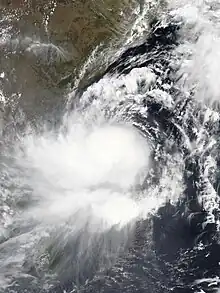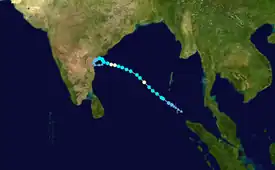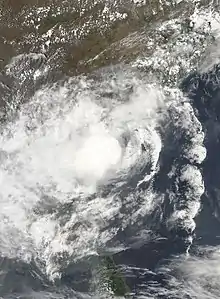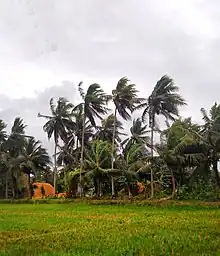Cyclone Asani
Severe Cyclonic Storm Asani[nb 1] was a strong tropical cyclone that made landfall in India in May 2022. It was the strongest storm of 2022 North Indian Ocean cyclone season. The third depression and deep depression, and the first named storm of the 2022 North Indian Ocean cyclone season, Asani originated from a depression that the Indian Meteorological Department first monitored on May 7. Conditions rapidly favored development as the system became a deep depression by that day before intensifying to a Cyclonic Storm Asani. On the next day it further intensified and peak to a severe cyclonic storm, before making landfall as a deep depression system over Andhra Pradesh. It degenerated into a well marked low-pressure on May 12.
 Cyclone Asani near peak intensity on May 9 | |
| Meteorological history | |
|---|---|
| Formed | May 7, 2022 |
| Dissipated | May 12, 2022 |
| Severe cyclonic storm | |
| 3-minute sustained (IMD) | |
| Highest winds | 100 km/h (65 mph) |
| Lowest pressure | 982 hPa (mbar); 29.00 inHg |
| Category 1-equivalent tropical cyclone | |
| 1-minute sustained (SSHWS/JTWC) | |
| Highest winds | 120 km/h (75 mph) |
| Lowest pressure | 976 hPa (mbar); 28.82 inHg |
| Overall effects | |
| Fatalities | 3 |
| Damage | >$1.57 million (2022 USD) |
| Areas affected | India (Andhra Pradesh, Tamil Nadu, Karnataka, Odisha, Andaman and Nicobar Islands) |
| [1][2] | |
Part of the 2022 North Indian Ocean cyclone season | |
Meteorological history

Tropical storm (39–73 mph, 63–118 km/h)
Category 1 (74–95 mph, 119–153 km/h)
Category 2 (96–110 mph, 154–177 km/h)
Category 3 (111–129 mph, 178–208 km/h)
Category 4 (130–156 mph, 209–251 km/h)
Category 5 (≥157 mph, ≥252 km/h)
Unknown
During the first week of May, a strong pulse of Madden-Julian Oscillation (MJO) and Equatorial Rossby wave (ERW) prevailed in this basin. These two conditions led to a formation, of a cyclonic circulation, over the southern Andaman Sea on May 4.[4][5] At the same day, a Westerly wind burst occurred which resulted in formation of twin cyclones over the Indian Ocean. the southern hemisphere counterpart being Tropical Cyclone Karim and the northern hemisphere counterpart being this cyclonic circulation.[6][7][8] The United States Joint Typhoon Warning Center (JTWC)[nb 2] followed the suit and designated as Invest 92B on the next day.[9]
During May 6, under the influence of the disturbance, a low pressure system off the coast of Andaman and Nicobar Islands.[10] Subsequently, the JTWC issued its Tropical Cyclone Formation Alert (TCFA), as it had rapidly consolidated its convective structure for the past few hours, along with development a well-defined low-level center.[11]
Late on May 7, the system became more well-marked low pressure area over the same region.[12] At 09:00 UTC, the JTWC initiated advisories on the system and classified it as Tropical Cyclone 02B, while India Meteorological Department (IMD)[nb 3] followed the suit and upgraded it to Depression BOB 03.[13][14] Three hours later, the system was further upgraded to a deep depression status by the IMD, after forming a defined central dense overcast cloud pattern.[15] By 00:00 UTC of the next day, the system organized into cyclonic storm and was assigned the named Asani, becoming the first cyclone of the season.[16] Nine hours later, the JTWC upgraded it to a Category 1-equivalent system on the Saffir–Simpson hurricane wind scale (SSHWS).[17] At 12:00 UTC, the IMD further upgraded it to a severe cyclonic storm, as the Microwave imaging shows well-organized system.[18]
The cyclone began to encounter high wind shear due to which the JTWC downgraded it as a tropical storm on May 10, while the IMD continue to maintain it as a severe cyclonic storm.[19][20] it began to make a sudden westward jog and mild decrease in wind shear made the JTWC to upgrade it again into a Category 1-equivalent tropical cyclone.[21] Nine hours later, Cyclone Asani was further downgraded into a tropical storm, it began to weaken due to higher wind shear as well as dry air intrusion.[22] Thereafter, storm rapidly weakened into a cyclonic storm on May 11.[23] At 12:00 UTC it further degenerated into a deep depression as made landfall in Indian State of Andhra Pradesh.[24] The JTWC discontinue advisories for the system, at 15:00 UTC [25] The next day, The IMD reported that the system had weakened into a depression while moving inlands.[26] Asani eventually degenerating into a well-marked low pressure area and IMD issued its last advisory.[27]
Preparations and impact

India
The Government of India's Union Home Secretary Ajay Kumar Bhalla had reviewed preparation for the cyclone, deployed nine teams and kept seven teams reserved in Andhra Pradesh and Odisha aided by the National Disaster Response Force (NDRF); additional teams also had been readied.[28][29] The IMD issued the cyclone's warnings over Andhra Pradesh.[30] In West Bengal, Kolkata Municipal Corporation prepared their teams to start work immediately after the damage by the cyclone.[31]

In Visakhapatnam, Indian Navy has prepared six diving teams and 19 flood relief teams for assistance to civil authorities, along with five Indian Navy ships with relief material, and diving teams along the coast of Andhra Pradesh and Odisha.[32] The cyclone's associated strong wind caused very heavy rain over Kerala, Andhra Pradesh, and Odisha.[33] IndiGo cancelled 23 flights from Visakhapatnam International Airport. four Air Asia flights were also cancelled at the place for the day, 10 flights at the Chennai airport, including those from Hyderabad, Visakhapatnam, Jaipur and Mumbai, also had been canceled.[34] About 30,225 estimate crops were affected.[35] Damage in Nandyal, Anantapur and Sri Sathya Sai districts wasestimated at Rs121.2 million (US$1.57 million).[36]
Three fatalities were confirmed from the cyclone as of May 19. A Mandal Parishad Territorial Constituency (MPTC) from YSR Congress Party was killed after a Palmyra tree fell over him. A 43-year-old man was killed as a wall collapsed over him in the house of Kamanagaruvu village in Amalapuram. Another man was killed by a lightning strike at Jalandaki in Nellore district.[37]
Bangladesh
4,915 cyclone shelter centres has been prepared by Barisal divisional administration in five coastal districts, two million people in livestock.[38][39] District Administration of Cox's Bazar has also taken necessary measures for refugee Rohingyas in Ukhia and Teknaf camps.[40]
See also
- Weather of 2022
- Tropical cyclones in 2022
- Cyclone Lehar – a tropical cyclone that affected the Indian state of Andhra Pradesh.
- Cyclone Laila – last cyclone to hit Andhra Pradesh during the month of May.
- Cyclone Yaas – a strong tropical cyclone that made landfall in Odisha during May 2021.
- Cyclone Phailin – an intense tropical cyclone during October 2013.
- Cyclone Bijli – a weak tropical cyclone that impacted Myanmar.
- Cyclone Jawad – a tropical cyclone during December 2021
Notes
- The name was provided by Sri Lanka, which means wrath in Sinhalese.[3]
- The Joint Typhoon Warning Center is a joint United States Navy – United States Air Force task force that issues tropical cyclone warnings for the Northern Indian Ocean and other regions.
- The India Meteorological Department is the official Regional Specialized Meteorological Center for the Northern Indian Ocean.
References
- Tracks of Cyclones and Depressions for the period of Jan-Dec 2022 (PDF) (Report). India Meteorological Department. Retrieved August 5, 2023.
- "Trackfile of 02B.ASANI". U.S. Naval Research Laboratory. Retrieved August 5, 2023.
- Simran Kashyap (May 6, 2022). "How Cyclone Asani got its name? Why naming is important?". Oneindia. New Delhi, India. Archived from the original on May 9, 2022. Retrieved May 8, 2022.
- "North Indian Ocean Extended Range Outlook for Cyclogenesis" (PDF). rsmcnewdelhi.imd.gov.in. New Delhi, India: India Meteorological Department. May 5, 2022. Archived from the original (PDF) on May 7, 2022. Retrieved May 7, 2022.
- "Tropical Weather Outlook for the North Indian Ocean (the Bay of Bengal and the Arabian Sea)" (PDF). rsmcnewdelhi.imd.gov.in. New Delhi, India: India Meteorological Department. May 6, 2022. Archived (PDF) from the original on May 7, 2022. Retrieved May 6, 2022.
- "North Indian Ocean Extended Range Outlook for Cyclogenesis" (PDF). rsmcnewdelhi.imd.gov.in. New Delhi, India: India Meteorological Department. May 5, 2022. Archived from the original (PDF) on May 7, 2022. Retrieved May 7, 2022.
- "Tropical Weather Outlook for the North Indian Ocean (the Bay of Bengal and the Arabian Sea)" (PDF). rsmcnewdelhi.imd.gov.in. New Delhi, India: India Meteorological Department. May 6, 2022. Archived (PDF) from the original on May 7, 2022. Retrieved May 6, 2022.
- "Twin Cyclones — Asani and Karim — Form Over Indian Ocean; Satellite Images Capture Twins on Opposite Sides of Equator | The Weather Channel - Articles from The Weather Channel | weather.com". The Weather Channel. Archived from the original on May 20, 2022. Retrieved May 21, 2022.
- Significant Tropical Weather Advisory for the Indian Ocean, 0230Z 5 May 2022 Reissued (Report). United States Joint Typhoon Warning Center. May 5, 2022. Archived from the original on February 13, 2018. Retrieved May 5, 2022. Alt URL
- Monica Sharma (May 6, 2022). "Tropical Weather Outlook for the North Indian Ocean (the Bay of Bengal and the Arabian Sea)" (PDF). rsmcnewdelhi.imd.gov.in. New Delhi, India: India Meteorological Department. Archived from the original (PDF) on May 6, 2022. Retrieved May 6, 2022.
- Tropical Cyclone Formation Alert (Invest 92B) (Report). United States Joint Typhoon Warning Center. May 6, 2022. Archived from the original on October 22, 2022. Retrieved May 6, 2022. Alt URL
- Monica Sharma (May 7, 2022). "Special Tropical Weather Outlook for the North Indian Ocean (the Bay of Bengal and the Arabian Sea)" (PDF). rsmcnewdelhi.imd.gov.in. New Delhi, India: India Meteorological Department. Archived from the original (PDF) on May 7, 2022. Retrieved May 7, 2022.
- Prognostic Reasoning for Tropical Cyclone 02B (Two) Warning No. 1 (Report). United States Joint Typhoon Warning Center. May 7, 2022. Archived from the original on May 7, 2022. Retrieved May 7, 2022. Alt URL
- Monica Sharma (May 7, 2022). "Special Tropical Weather Outlook for the North Indian Ocean (the Bay of Bengal and the Arabian Sea)" (PDF). rsmcnewdelhi.imd.gov.in. New Delhi, India: India Meteorological Department. Archived from the original (PDF) on May 7, 2022. Retrieved May 7, 2022.
- R.K Jenamani (May 7, 2022). "Special Tropical Weather Outlook for the North Indian Ocean (the Bay of Bengal and the Arabian Sea)" (PDF). rsmcnewdelhi.imd.gov.in. New Delhi, India: India Meteorological Department. Archived from the original (PDF) on May 7, 2022. Retrieved May 7, 2022.
- R.K Jenamani (May 8, 2022). "Tropical Cyclone Advisory No. 1 for the North Indian Ocean (the Bay of Bengal and the Arabian Sea)" (PDF). rsmcnewdelhi.imd.gov.in. New Delhi, India: India Meteorological Department. Archived from the original (PDF) on May 8, 2022. Retrieved May 8, 2022.
- Prognostic Reasoning for Tropical Cyclone 02B (Asani) Warning No. 5 (Report). United States Joint Typhoon Warning Center. May 8, 2022. Archived from the original on May 7, 2022. Retrieved May 8, 2022. Alt URL
- R.K Jenamani (May 8, 2022). "Tropical Cyclone Advisory No. 5 for the North Indian Ocean (the Bay of Bengal and the Arabian Sea)" (PDF). rsmcnewdelhi.imd.gov.in. New Delhi, India: India Meteorological Department. Archived (PDF) from the original on May 9, 2022. Retrieved May 8, 2022.
- Prognostic Reasoning for Tropical Cyclone 02B (Asani) Warning No. 4 (Report). United States Joint Typhoon Warning Center. May 8, 2022. Archived from the original on May 7, 2022. Retrieved May 8, 2022. Alt URL
- R.K Jenamani (May 10, 2022). "Tropical Cyclone Advisory No. 17 for the North Indian Ocean (the Bay of Bengal and the Arabian Sea)" (PDF). rsmcnewdelhi.imd.gov.in. New Delhi, India: India Meteorological Department. Archived (PDF) from the original on May 10, 2022. Retrieved May 10, 2022.
- Prognostic Reasoning for Tropical Cyclone 02B (Asani) Warning No. 13 (Report). United States Joint Typhoon Warning Center. May 10, 2022. Retrieved May 10, 2022.
- Prognostic Reasoning for Tropical Cyclone 02B (Asani) Warning No. 14 (Report). United States Joint Typhoon Warning Center. May 10, 2022. Archived from the original on May 7, 2022. Retrieved May 10, 2022. Alt URL
- Monica Sharma (May 11, 2022). "Tropical Cyclone Advisory No. 25 for the North Indian Ocean (the Bay of Bengal and the Arabian Sea)" (PDF). rsmcnewdelhi.imd.gov.in. New Delhi, India: India Meteorological Department. Archived (PDF) from the original on May 11, 2022. Retrieved May 11, 2022.
- Dr R.K. Jenamani (May 11, 2022). "Special Tropical Weather Outlook for North Indian Ocean (the Bay of Bengal and the Arabian Sea)" (PDF). rsmcnewdelhi.imd.gov.in. New Delhi, India: India Meteorological Department. Archived (PDF) from the original on May 22, 2022. Retrieved May 11, 2022.
- Tropical Cyclone 02B (Asani) Warning No. 18 (Report). United States Joint Typhoon Warning Center. May 11, 2022. Retrieved May 11, 2022.
- Amit Bhardwaj (May 12, 2022). "Special Tropical Weather Outlook for North Indian Ocean (the Bay of Bengal and the Arabian Sea)" (PDF). rsmcnewdelhi.imd.gov.in. New Delhi, India: India Meteorological Department. Archived (PDF) from the original on May 22, 2022. Retrieved May 12, 2022.
- R.K Jenamani (May 12, 2022). "Special Tropical Weather Outlook for North Indian Ocean (the Bay of Bengal and the Arabian Sea)" (PDF). rsmcnewdelhi.imd.gov.in. New Delhi, India: India Meteorological Department. Archived (PDF) from the original on May 22, 2022. Retrieved May 12, 2022.
- "Home Secretary reviews cyclone Asani preparedness, around 50 NDRF teams on ground". www.aninews.com. Archived from the original on May 21, 2022. Retrieved May 10, 2022.
- "Union Home Secy Reviews Cyclone Asani Preparedness; NDRF Deployed In Andhra, Odisha, Bengal". Pragativadi News Service. May 10, 2022. Archived from the original on May 11, 2022. Retrieved May 10, 2022.
- Shobhit Katiyar) (May 11, 2022). "National Bulletin NO.28 (BOB/03/2022)" (PDF). rsmcnewdelhi.imd.gov.in. New Delhi, India: India Meteorological Department. Archived (PDF) from the original on May 11, 2022. Retrieved May 10, 2022.
- "Leaves of all Kolkata corporation staff to be cancelled amid cyclone Asani alert". Hindustan Times. May 8, 2022. Archived from the original on May 21, 2022. Retrieved May 22, 2022.
- "Cyclone Asani: Navy's Eastern Command in Visakhapatnam steps up with aid". The Indian Express. May 10, 2022. Archived from the original on May 10, 2022. Retrieved May 10, 2022.
- TWC India Edit Team (May 11, 2022). "Cyclone Asani LIVE: Asani Weakens into Deep Depression; Landfall Completed Between Machilipatnam and Narsapur". www.weather.com. Weather. Archived from the original on May 12, 2022. Retrieved May 13, 2022.
- "Cyclone Asani: 23 flights cancelled in Andhra's Visakhapatnam, 10 in Chennai". The Economic Times. Archived from the original on May 12, 2022. Retrieved May 21, 2022.
- Samaritan, Sampat G. (May 12, 2022). "Cyclone Asani affects crops in 30,000 hectares in Andhra Pradesh". Deccan Chronicle. Archived from the original on May 14, 2022. Retrieved May 22, 2022.
- "Damage of Rs 12.12 crore by Cyclone Asani". Nursery Today. May 12, 2022. Retrieved May 22, 2022.
- "Three Killed as Cyclone Asani Hits Coastal Andhra, Heavy Winds Damage Crop". Vijayawada, Andhra Pradesh: Sakshi Post. May 12, 2022. Archived from the original on May 22, 2022. Retrieved May 12, 2022.
- "Cyclone 'Asani': Five coastal districts on alert". The Business Standard. May 9, 2022. Archived from the original on May 10, 2022. Retrieved May 10, 2022.
- "Five coastal districts on alert over cyclone 'Asani'". The Financial Express. Archived from the original on May 21, 2022. Retrieved May 10, 2022.
- "Preparations underway at Rohingya camps in Cox's Bazar to tackle Cyclone Asani". The Daily Star. May 7, 2022. Archived from the original on May 7, 2022. Retrieved May 7, 2022.
External links
- JTWC Best Track Data of Tropical Cyclone 02B (Asani)
- 02B.ASANI from the U.S. Naval Research Laboratory
